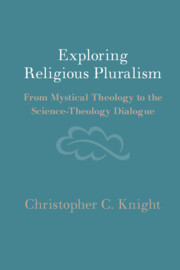Book contents
- Exploring Religious Pluralism
- Exploring Religious Pluralism
- Copyright page
- Epigraph
- Contents
- 1 Introduction
- 2 Apophaticism and Perennialism
- 3 The Philosophy of Religion and Its Limitations
- 4 Philosophy and Noetic Perception
- 5 Philosophy and the Pluralistic Hypothesis
- 6 Beyond Philosophical Argument
- 7 Archetypes and ‘Platonic’ Mysticism
- 8 Noetic Perception and the Role of the Imagination
- 9 The Evolution of Religiosity
- 10 Revelation and Divine Action
- 11 A Pluralistic Model in the Making
- 12 Pluralism or ‘Reciprocal Inclusivism’?
- Afterword
- Bibliography
- Index
11 - A Pluralistic Model in the Making
Published online by Cambridge University Press: 14 March 2024
- Exploring Religious Pluralism
- Exploring Religious Pluralism
- Copyright page
- Epigraph
- Contents
- 1 Introduction
- 2 Apophaticism and Perennialism
- 3 The Philosophy of Religion and Its Limitations
- 4 Philosophy and Noetic Perception
- 5 Philosophy and the Pluralistic Hypothesis
- 6 Beyond Philosophical Argument
- 7 Archetypes and ‘Platonic’ Mysticism
- 8 Noetic Perception and the Role of the Imagination
- 9 The Evolution of Religiosity
- 10 Revelation and Divine Action
- 11 A Pluralistic Model in the Making
- 12 Pluralism or ‘Reciprocal Inclusivism’?
- Afterword
- Bibliography
- Index
Summary
The considerations outlined in earlier parts of the book are recalled in order to emphasize the importance of unconscious processes in the development of religious cognition. In this context, the importance of mythological aspects of religious texts is stressed, since the archetypal resonances of these texts – especially when reflected in liturgical usage or used in contemplative exercises – are of considerable importance in relation to noetic apprehension of the divine reality. In this context, the five theses set out in in Chapter 1 are discussed in more detail. In addition, problems of elitism and its suppression are discussed, as well as the position of those who claim to be spiritual but not religious. It is suggested that these people may, in fact, need one of the ‘doctrinal religions’ that they shun if they are to make progress on the spiritual path on which they find themselves.
- Type
- Chapter
- Information
- Exploring Religious PluralismFrom Mystical Theology to the Science-Theology Dialogue, pp. 178 - 193Publisher: Cambridge University PressPrint publication year: 2024

